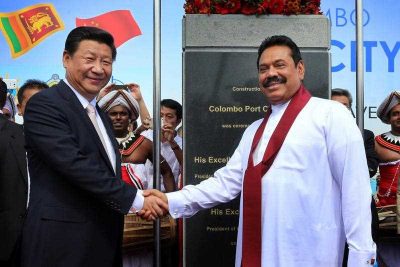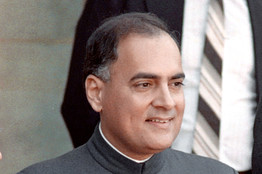Sky lord
SENIOR MEMBER

- Joined
- Mar 20, 2015
- Messages
- 3,149
- Reaction score
- 1
- Country
- Location
Interesting write up - what do you think?
There is a famous Tamil comedy scene involving the veteran actor Vadivelu that debates whether a person with a fair skin can be unfair in his actions. It is a comedy - but there is some truth to our perceptions of our leaders dominated by the looks.
There seems to be a "whitewashing" of history, when it comes to the "fairest" of Indian Prime Ministers - Rajiv Gandhi. As we celebrate his 70th birthday, let us learn some facts.
Rajiv Gandhi is India's answer to John F. Kennedy - both equally handsome, equally young, equally clueless, equally overrated, who got assassinated due to their lax attitudes that put publicity over security. Any case, why would anyone hate this guy who "looks" so nice?

Horrors of Rajiv
Of the Indian Prime Ministers - "day dreamer" Nehru can be excused for building the nation and acquiring the various territories. Morarji Desai, who messed up the RAW can be excused for cleaning up the administration and Constitution repealing the mess that Indira brought during Emergency. The "sleeping beauty" Dewe Gowda could be excused for bringing one of the best budgets in the only year he ruled.
Shastri was very honorable, "non-smiler" Rao heralded the economic reforms, "slow talking" Vajpayee strengthened the defense, foreign policy and economy. "Muted man" Manmohan despite being a silent spectator didn't commit big blunders outside of the scams, "invisible" IK Gujral was good in foreign policy. VP Singh was bad, but didn't commit a big blunder outside of Mandal.
Indira is a strong contender for the worst PM, but somewhat excused for winning the 1971 war, nuclearizing India and standing strong against the superpowers.
Why Rajiv is the worst.
This leaves only one Prime Minister - Rajiv Gandhi - for the title of the worst Prime Minister, beating even his own mother on this. His positives were nothing compared to the blunders he committed through inexperience.
With Rajiv we had - mismanagement of Sri Lankan terrorism, Punjab terrorism, worst of India's pogrom, worst industrial disaster, biggest terrorist attacks, the start of Kashmiri terrorism, the start of Babri Masjid crisis... Rajiv has been such a horror that he is practically peerless. The only reason we refuse to hate Rajiv is because he is good looking and we are fundamentally wired to not hate such figures.
Conclusion
There is an ancient parable about a barbarous king who forced his subjects to give up their rice in return for taking his paddy. Since rice was 2x more valuable than paddy, the people lost a lot. He was highly unpopular. On his death bed, the king wanted his son to repair his bad name.
The loving son thus made a new law. He commanded that people had to give up rice in return for taking cattle food. This was even worse than the previous king and thus the people started celebrating the old king looking at his reign with nostalgia. This is what happens in the Nehru family.
This is apt for the Nehru family - where every successor is so worse compared to their predecessor that we tend to think of the old man/old woman in a much more positive way.
There is a famous Tamil comedy scene involving the veteran actor Vadivelu that debates whether a person with a fair skin can be unfair in his actions. It is a comedy - but there is some truth to our perceptions of our leaders dominated by the looks.
There seems to be a "whitewashing" of history, when it comes to the "fairest" of Indian Prime Ministers - Rajiv Gandhi. As we celebrate his 70th birthday, let us learn some facts.
Rajiv Gandhi is India's answer to John F. Kennedy - both equally handsome, equally young, equally clueless, equally overrated, who got assassinated due to their lax attitudes that put publicity over security. Any case, why would anyone hate this guy who "looks" so nice?
Horrors of Rajiv
- Indian Peace Keeping Force: Indian Army has a very honorable record. It had barely lost in any operation it planned and it was never misused fighting random wars elsewhere. However, in a Bush-like action, Rajiv sent 100,000 armed men to Sri Lanka that was widely hated as an occupying force and thrown out in ignominy. Overall 1200 armed men died and plenty more of both Tamils & Sinhalese lost lives. It was VP Singh who finally brought the army home after he won the elections, ending the shame. However, when Rajiv threatened to bring shame 2.0 for the Army, the LTTE lost its cool and assassinated the leader. Rajiv Gandhi didn't consul even his cabinet on IPKF: Natwar Singh
Rajiv hit by a Sri Lankan navy man - after announcing IPKF. - Rigging elections in Kashmir leading to terrorism: In 1987, the Kashmir valley was a fairly peaceful one - much more peaceful than Punjab or Assam. The state's residents were quite excited by the upcoming 1987 assembly elections. Even the separatists were actively engaged in the elections. But, they were horribly disappointed in one of the worst Indian elections. Internationally it is agreed that the Congress rigged that elections to favor its ally - National Conference. The people were so disappointed that it brought the rise of Mujahideen in the valley and marked the start of its violent phase.
- Look at how violence ballooned since 1988. Vajpayee regime started bringing it down finally.
- The Shah Bano legacy: A poor 60 year old Muslim woman went to the court seeking Rs. 200/month from her husband, for supporting her 5 children after the lawyer husband deserted her, uttering Talaq three times. Both the High Court and Supreme Court ruled in the woman's favor. However, Rajiv overruled the court with a new legislation and took away the basic rights of Muslim women in India to appease the conservative clergy. The Muslim Women (Protection of Rights on Divorce) Act 1986. He also banned Salman Rushdie's classic work - Satanic Verses [even before any Islamic nation did]. As BJP brought nationwide riots, he tried to throw them a few - opening the gates of Babri Masjid and permitting construction near the Masjid [eventually leading to the controversial Mosque's destruction.
- Bofors scandal: Sonia Gandhi and her Italian contacts allegedly led to India's biggest scam of the time - Bofors scandal [Ms. Gandhi then broke her own record in the 2004-14 regime with 2G]. It involved getting large kickbacks in buying guns from a Swedish firm Bofors. Whether he did the crime or not, handling such a matter of national security in such a non-transparent way once again showed his greenhorn attitude.
- Bhopal gas tragedy: 'Govt, Union Carbide struck secret deal post leak': In almost every aspect, Rajiv's rule was one of the most disastrous periods of India. He was the Prime Minister when Bhopal Gas tragedy (world's worst industrial disaster) struck. He had the chief of Union Carbide in India. But, Rajiv let him go free. The disaster was once again mismanaged.
- 1984 anti-Sikh riots: Rajiv's party presided over the biggest pogrom in India's history - 8000 Sikhs were murdered right around the national capital as a vengeance for the assassination of his mother - Indira Gandhi. This is 10x the size of 2002 riots and led to further assassinations as Sikh militants claimed their own vengeance by bombing several trains in Ludhiana and bombing an Air India plane from Canada. Air India Flight 182
Of the Indian Prime Ministers - "day dreamer" Nehru can be excused for building the nation and acquiring the various territories. Morarji Desai, who messed up the RAW can be excused for cleaning up the administration and Constitution repealing the mess that Indira brought during Emergency. The "sleeping beauty" Dewe Gowda could be excused for bringing one of the best budgets in the only year he ruled.
Shastri was very honorable, "non-smiler" Rao heralded the economic reforms, "slow talking" Vajpayee strengthened the defense, foreign policy and economy. "Muted man" Manmohan despite being a silent spectator didn't commit big blunders outside of the scams, "invisible" IK Gujral was good in foreign policy. VP Singh was bad, but didn't commit a big blunder outside of Mandal.
Indira is a strong contender for the worst PM, but somewhat excused for winning the 1971 war, nuclearizing India and standing strong against the superpowers.
Why Rajiv is the worst.
This leaves only one Prime Minister - Rajiv Gandhi - for the title of the worst Prime Minister, beating even his own mother on this. His positives were nothing compared to the blunders he committed through inexperience.
With Rajiv we had - mismanagement of Sri Lankan terrorism, Punjab terrorism, worst of India's pogrom, worst industrial disaster, biggest terrorist attacks, the start of Kashmiri terrorism, the start of Babri Masjid crisis... Rajiv has been such a horror that he is practically peerless. The only reason we refuse to hate Rajiv is because he is good looking and we are fundamentally wired to not hate such figures.
Conclusion
There is an ancient parable about a barbarous king who forced his subjects to give up their rice in return for taking his paddy. Since rice was 2x more valuable than paddy, the people lost a lot. He was highly unpopular. On his death bed, the king wanted his son to repair his bad name.
The loving son thus made a new law. He commanded that people had to give up rice in return for taking cattle food. This was even worse than the previous king and thus the people started celebrating the old king looking at his reign with nostalgia. This is what happens in the Nehru family.
This is apt for the Nehru family - where every successor is so worse compared to their predecessor that we tend to think of the old man/old woman in a much more positive way.














